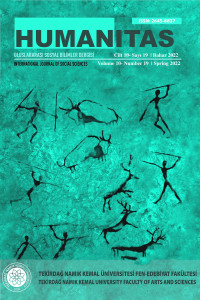Öz
Anahtar Kelimeler
Postdramatic Theatre Aristotle Three Kingdoms Consumption Misogyny
Kaynakça
- Angelaki, V. (2014). Witness or accomplice? Unsafe spectatorship in the work of Anthony Neilson and Simon Stephens. In M. Aragay and E. Monforte (Ed.), Ethical speculations in contemporary British theatre (1. Edition) on (135-151). Basingstoke: Palgrave Macmillan.
- Baudrillard, J. (1998). The consumer society: myths and structures. London: Sage.
- Barnett, D. (2016). Simon Stephens: British playwright in dialogue with Europe. Contemporary Theatre Review, 26(3), 305-310.
- Bolton, C. (2016). ‘Changing the conversation’: Simon Stephens, Sean Holmes, and Secret Theatre. Contemporary Theatre Review, 26(3), 337-344.
- Burger, J.M. (2014). Personality. Boston: Cengage.
- Fowler, B. (2016). ‘Draining the English Channel’: the European revolution in Three Kingdoms and three keynotes (by Simon Stephens, David Lan, and Edward Bond). Contemporary Theatre Review, 26(3), 328-336.
- Holland, J. (2006). Misogyny: the world’s oldest prejudice. Philadelphia: Running Publication.
- Hoydan, A. (2012, May 10). Three Kingdoms, Lyric Hammersmith. Postcards from the Gods. Retrieved July 19, 2021, from http://postcardsgods.blogspot.com/2012/05/three-kingdoms-lyric-hammersmith.html.
- İlter, S. (2013). Mediatised dramaturgy: formal, critical and performative responses to mediatısation in British and Irish plays since the 1990s. (Unpublished Master’s Thesis) University of Sussex, Brighton.
- Lehmann, H. T. (2006). Postdramatic theatre. Oxfordshire: Routledge.
- Lehmann, H. T. (2016). Tragedy and dramatic theatre. Oxfordshire: Routledge.
- Love, C. (2016). New perspectives on home: Simon Stephens and authorship in British theatre. Contemporary Theatre Review, 26(3), 319-327.
- Nutku, Ö. (2000). Dünya tiyatrosu tarihi 1. İstanbul: Mitos Boyut.
- Poll, M. (2016). When little is said and feminism is done? Simon Stephens, the critical blogosphere and modern misogyny. Contemporary Theatre Review. Available online: https://www.contemporarytheatrereview.org/2016/when-little-is-said-and-feminism-is-done/.
- Reinelt, J. (2017). Is a trafficked woman a citizen? survival and citizenship in performance. In B. Dutt, J. Reinelt and S. Sahai (Ed.), Gendered citizenship: Manifestations and performance (1. Edition) on (237-254). New York: Palgrave Macmillan.
- Sayın, G. (2016). Simon Stephens tiyatrosu: Dramatik metinden performans metnine. In D. Bozer (Ed.), Postdramatik tiyatro ve İngiliz tiyatrosu (1. Edition) on (115-143). İstanbul: Mitos Boyut.
- Sierz, A. (2001). In-yer-face theatre: British drama today. London: Faber.
- Stephens, S. (2015). Plays 4. London: Bloomsbury.
- Trueman, M. (2012, May 13). Review: Three kingdoms, Lyric Hammersmith. Matt Trueman. Retrieved July 16, 2021, from http://matttrueman.co.uk/2012/05/review-three-kingdoms-lyric-hammersmith.html.
- Zaroulia, M. (2016). The invisible other in excess: (dis)placing Europe in Simon Stephens’s Three Kingdoms. Contemporary Theatre Review, 26(3), 319-327.
Öz
Anahtar Kelimeler
Postdramatik Tiyatro Aristoteles Üç Krallık Tüketim Mizojini
Kaynakça
- Angelaki, V. (2014). Witness or accomplice? Unsafe spectatorship in the work of Anthony Neilson and Simon Stephens. In M. Aragay and E. Monforte (Ed.), Ethical speculations in contemporary British theatre (1. Edition) on (135-151). Basingstoke: Palgrave Macmillan.
- Baudrillard, J. (1998). The consumer society: myths and structures. London: Sage.
- Barnett, D. (2016). Simon Stephens: British playwright in dialogue with Europe. Contemporary Theatre Review, 26(3), 305-310.
- Bolton, C. (2016). ‘Changing the conversation’: Simon Stephens, Sean Holmes, and Secret Theatre. Contemporary Theatre Review, 26(3), 337-344.
- Burger, J.M. (2014). Personality. Boston: Cengage.
- Fowler, B. (2016). ‘Draining the English Channel’: the European revolution in Three Kingdoms and three keynotes (by Simon Stephens, David Lan, and Edward Bond). Contemporary Theatre Review, 26(3), 328-336.
- Holland, J. (2006). Misogyny: the world’s oldest prejudice. Philadelphia: Running Publication.
- Hoydan, A. (2012, May 10). Three Kingdoms, Lyric Hammersmith. Postcards from the Gods. Retrieved July 19, 2021, from http://postcardsgods.blogspot.com/2012/05/three-kingdoms-lyric-hammersmith.html.
- İlter, S. (2013). Mediatised dramaturgy: formal, critical and performative responses to mediatısation in British and Irish plays since the 1990s. (Unpublished Master’s Thesis) University of Sussex, Brighton.
- Lehmann, H. T. (2006). Postdramatic theatre. Oxfordshire: Routledge.
- Lehmann, H. T. (2016). Tragedy and dramatic theatre. Oxfordshire: Routledge.
- Love, C. (2016). New perspectives on home: Simon Stephens and authorship in British theatre. Contemporary Theatre Review, 26(3), 319-327.
- Nutku, Ö. (2000). Dünya tiyatrosu tarihi 1. İstanbul: Mitos Boyut.
- Poll, M. (2016). When little is said and feminism is done? Simon Stephens, the critical blogosphere and modern misogyny. Contemporary Theatre Review. Available online: https://www.contemporarytheatrereview.org/2016/when-little-is-said-and-feminism-is-done/.
- Reinelt, J. (2017). Is a trafficked woman a citizen? survival and citizenship in performance. In B. Dutt, J. Reinelt and S. Sahai (Ed.), Gendered citizenship: Manifestations and performance (1. Edition) on (237-254). New York: Palgrave Macmillan.
- Sayın, G. (2016). Simon Stephens tiyatrosu: Dramatik metinden performans metnine. In D. Bozer (Ed.), Postdramatik tiyatro ve İngiliz tiyatrosu (1. Edition) on (115-143). İstanbul: Mitos Boyut.
- Sierz, A. (2001). In-yer-face theatre: British drama today. London: Faber.
- Stephens, S. (2015). Plays 4. London: Bloomsbury.
- Trueman, M. (2012, May 13). Review: Three kingdoms, Lyric Hammersmith. Matt Trueman. Retrieved July 16, 2021, from http://matttrueman.co.uk/2012/05/review-three-kingdoms-lyric-hammersmith.html.
- Zaroulia, M. (2016). The invisible other in excess: (dis)placing Europe in Simon Stephens’s Three Kingdoms. Contemporary Theatre Review, 26(3), 319-327.
Ayrıntılar
| Birincil Dil | İngilizce |
|---|---|
| Bölüm | Tüm Sayı |
| Yazarlar | |
| Yayımlanma Tarihi | 15 Mart 2022 |
| Yayımlandığı Sayı | Yıl 2022 Cilt: 10 Sayı: 19 |









